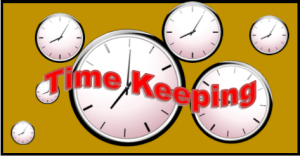3 Reasons to Track Time in Fixed Fee Cases
 Should you keep track of your time in every case – even those with flat, fixed and contingent fees?
Should you keep track of your time in every case – even those with flat, fixed and contingent fees?
That question was asked recently on LinkedIn. And the responses from across the country were almost uniformly: Yes.
Here is a sampling:
- Yes. To do anything else would be foolish. Good time records are invaluable. One never knows when they might be needed to prove up fees and/or work done. Sometimes a client relationship takes a bad turn and if you don’t have good records, you’re out of luck.
- Yes. I do for all the reasons mentioned above PLUS it enables you to verify that the fixed fee assigned to the matter type is continuing to cover the time involved in the “average” case, or to adjust the fixed fee as needed. Once a year we review fixed fee time reports to ensure our fee schedule is continuing to align with reality.
- It’s super smart to do annual reviews and adjust fees accordingly.
- I try to keep track of time for fixed fee matters, but sometimes struggle with how to track that time on my Quickbooks timesheet.
- I use Office Time to track my time. The software is easy to use and can produce invoices. I definitely track my time on fixed-fee cases so that I can determine if the fixed fee is fair to me. If I see that I am consistently undercharging for the work I do, I can make changes.
- My goodness, yes. How otherwise do you know that the fixed-fee is approximately correlated to your time-value required for the representation? As an additional value (although I’ve never needed it), keeping time on a fixed-fee case leaves you prepared to rebut a possible squabble from client about the fee.
- Absolutely! Question I had is whether the client gets the hourly work up or is it just for your purposes. Answer I got was hourly report is just for you and not client.
Is Keeping Time a Time-Waster?
One expert offers an opposing view.
“[P]rofitability has nothing to do with time or keeping timesheets,” writes Allison C. Shields of Legal Ease. “The money that the firm pays to its employees, associates and partners are costs. The time itself is only a cost to the individual lawyer, not to the firm or the practice, particularly when revenue is not dependent upon hours worked. And even then, the cost of every hour is not consistent or fixed. Nor is the value of that hour. And I’d be willing to bet that most lawyers have a good handle on how much time they spend working (and how much of that time is productive), whether they’re keeping timesheets or not.”
Shields says the best time to determine profitability is before you accept the case, not after you’ve done the work.
“That can only be done by establishing the value of your services to the client at the outset and basing your fee upon that value. You need to know your costs in advance. Tracking time is done after the work has already been performed, and as such, is a poor way to determine cost (and therefore profitability).”
Three Reasons to Keep Timesheets
Regardless of how your fee is calculated, here are three reasons to keep track of your time:
- A detailed activity log could be your best defense to a malpractice claim alleging you did little or nothing in the case.
- Time sheets (edited as needed) can be sent to clients to update them on the progress of the case.
- If you need to go back and review a closed file, scanning time logs will provide a quick case overview.
What about you? Do you keep track of your time in non-billable cases? Why or why not?
Sources:
- LinkedIn https://www.linkedin.com
- Allison C. Shields, Legal Ease http://legalease.blogs.com/about.html
- American Bar Association http://www.americanbar.org/publications/law_practice_today_home/law_practice_today_archive/may11/challenging_the_idea_that_you_need_timesheets_to_determine_profitability.html




